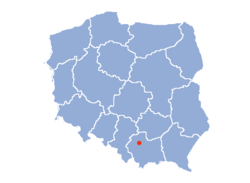Jagiellonian University
|
|
| Jagiellonian University | |
|---|---|
| Missing image Jagiellonian_University.png Coat of Arms of the Jagiellonian University | |
| Data | |
| Motto | Plus ratio quam vis (Reason means more than power) |
| Polish | Uniwersytet Jagielloński |
| Latin | Universitas Jagiellonica Cracoviensis |
| Established | 1364 |
| Location | Kraków, Poland (EU) |
| Enrolment | 41 086 (November 30, 2004) |
| Rector | Professor Franciszek Ziejka |
| Address | Collegium Novum, ul. Gołębia 24 31-007 Kraków Poland |
| Phone | (+48 12) 422-10-33 |
| rektor@adm.uj.edu.pl | |
| Homepage | www.uj.edu.pl (http://www.uj.edu.pl/index.en.html) |
| Membership | EUA, Coimbra Group, Europaeum |
| Map | |
 Kraków in Poland | |
Jagiellonian University (Polish: Uniwersytet Jagielloński) is a university in Krakow, Poland. It was founded in 1364 by Casimir III of Poland as Akademia Krakowska.
| Contents |
History
Its development was stalled by the death of the king, and later the university was re-established (1400) by King Wladislaus Jagiello and his wife Jadwiga. The queen donated all of her personal jewelry to the university. In the 19th century the university was named Jagiellonian to commemorate this dynasty of Polish kings.
Throughout the history of the University, thousands of students from all over Poland, from Lithuania, Russia, Slovakia, Hungary, Bohemia, Germany and Spain have studied there. In the second half of the 15th century, over 40% of university students came from the countries other than the Kingdom of Poland. For several centuries, virtually the entire intellectual elite of Poland was educated at the University.
The first chancellor of the university was Peter Wysz and the first professors were Czechs, Germans and Poles, many of them trained at the University of Prague in Bohemia. The university and the chancellors were partisans of the Council of Basel. Of the students attending about one third were Poles.
Haller established a printing press in Krakow before 1500. By 1520 Greek philology was introduced by Constanzo Claretti, Wenzel von Hirschberg and Libanus; Hebrew was also taught.
Alumni
Famous historical figures connected with the University:
- Nicolaus Copernicus (1473-1543), astronomer, founder of heliocentrism
- Józef Cyrankiewicz (1911-1989), communist politician, prime minister of Poland (1947-1970)
- Norman Davies (b. 1939), British historian
- Antoni Kępiński (1918-1972), psychiatrist
- Jan Kochanowski (1530-1584), poet, one of the pioneers of the Polish language
- John of Kolno (1435–1484), explorer
- Stanisław Koniecpolski (1590?-1646), military commander and politician, Grand Hetman of the Crown
- Marcin Kromer (1512-1589), historian, a Prince-Bishop of Warmia
- Stanisław Lem (b. 1921), writer
- Johannes Longinus (1415-1480), historian
- Carl Menger (1840-1921), economist and lawyer, founder of the Austrian School of economics
- Andrzej Frycz Modrzewski (1503?-1572), poet, diplomat and political thinker
- Wacław Sierpinski (1882-1969), mathematician
- Francysk Skaryna (1485?-1540?), pioneer of the Belarusian language, the first to print a book in an Eastern Slavic language
- Henryk Sławik (1894-1944), diplomat, one of the people who helped Jews during the Holocaust, a Righteous Gentile
- Wisława Szymborska (b. 1923), poet, Nobel Prize in Literature (1996)
- John III Sobieski (1629-1696), military leader and a king of Polish-Lithuanian Commonwealth, won the Battle of Vienna
- Pope John Paul II (Karol Wojtyła, 1920-2005), poet, writer, pope and Catholic bishop of Rome
- Krzysztof Zanussi (b. 1939), film director
Professors
- Albert Brudzewski (1445-1497), astronomer and mathematician
- Stanislaw of Skarbimierz (1360-1431), rector, theologist, lawyer
- Paweł Włodkowic (1370-1435), lawyer, diplomat and politician, representative of Poland on the Council of Constance
- Tadeusz Sulimirski (1898-1983), historian and archaeologist, experts on the ancient Sarmatians
Enrollment
With 41,086 (2004) students and 3407 scientists it is one of the leading universities in Poland.
Library
The university library is one of the largest in the country, with almost 5.5 million volumes. It has a large collection of medieval manuscripts [1] (http://www.bj.uj.edu.pl/bjmanus/manus_e.html), for example Copernicus' De Revolutionibus or Balthasar Behem's Codex.
It also gathered the underground literature (so called drugi obieg) from the period of communist rule (1945-1989).
Organisation
The university is divided in 14 faculties:
- Law and Administration
- Medicine
- Pharmacy and Medical Analysis
- Health Care
- Philosophy
- History ([2] (http://www.uj.edu.pl/dispatch.jsp?item=uniwersytet/wydzialy/historyczny.jsp&lang=en))
- Philology
- Physics, Astronomy and Applied Computer Science
- Mathematics and Computer Science
- Chemistry
- Biology and Earth Sciences
- Management and Social Communication
- International and Political Studies
- Biotechnology
Since 2000 the university is building a new complex of university buildings, the so-called Third Campus.
External links
- Official Homepage (http://www.uj.edu.pl)
| Coimbra Group (of European research universities) | 
|
|---|---|
| Aarhus | Barcelona | Bergen | Bologna | Bristol | Budapest | Cambridge | Coimbra | Dublin | Edinburgh | Galway | Geneva | Göttingen | Granada | Graz | Groningen | Heidelberg | Jena | Kraków | Leiden | Leuven | Louvain | Lyon | Montpellier | Oxford | Padua | Pavia | Poitiers | Prague | Salamanca | Siena | Tartu | Thessaloniki | Turku I | Turku II | Uppsala | Würzburg | |
